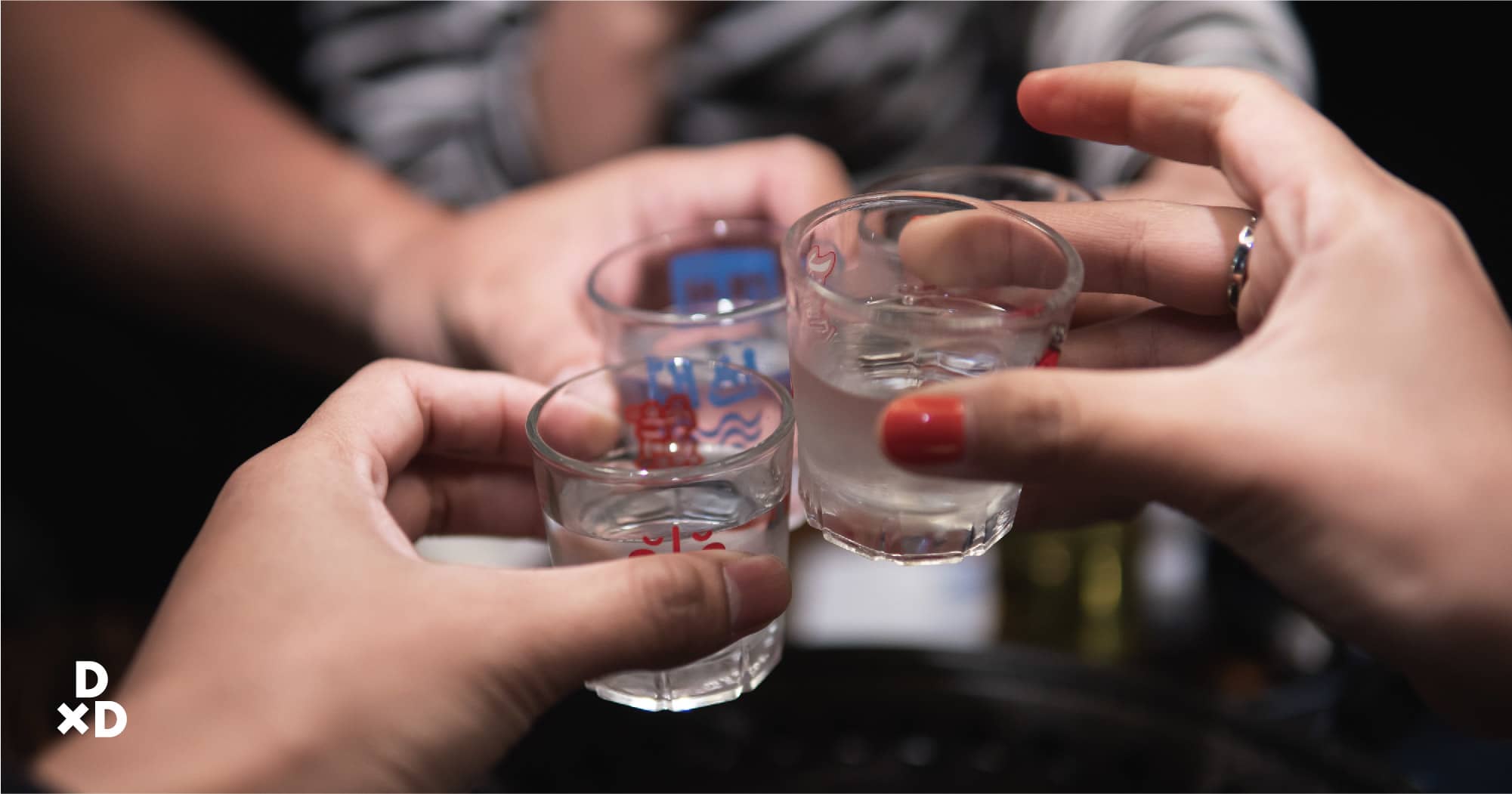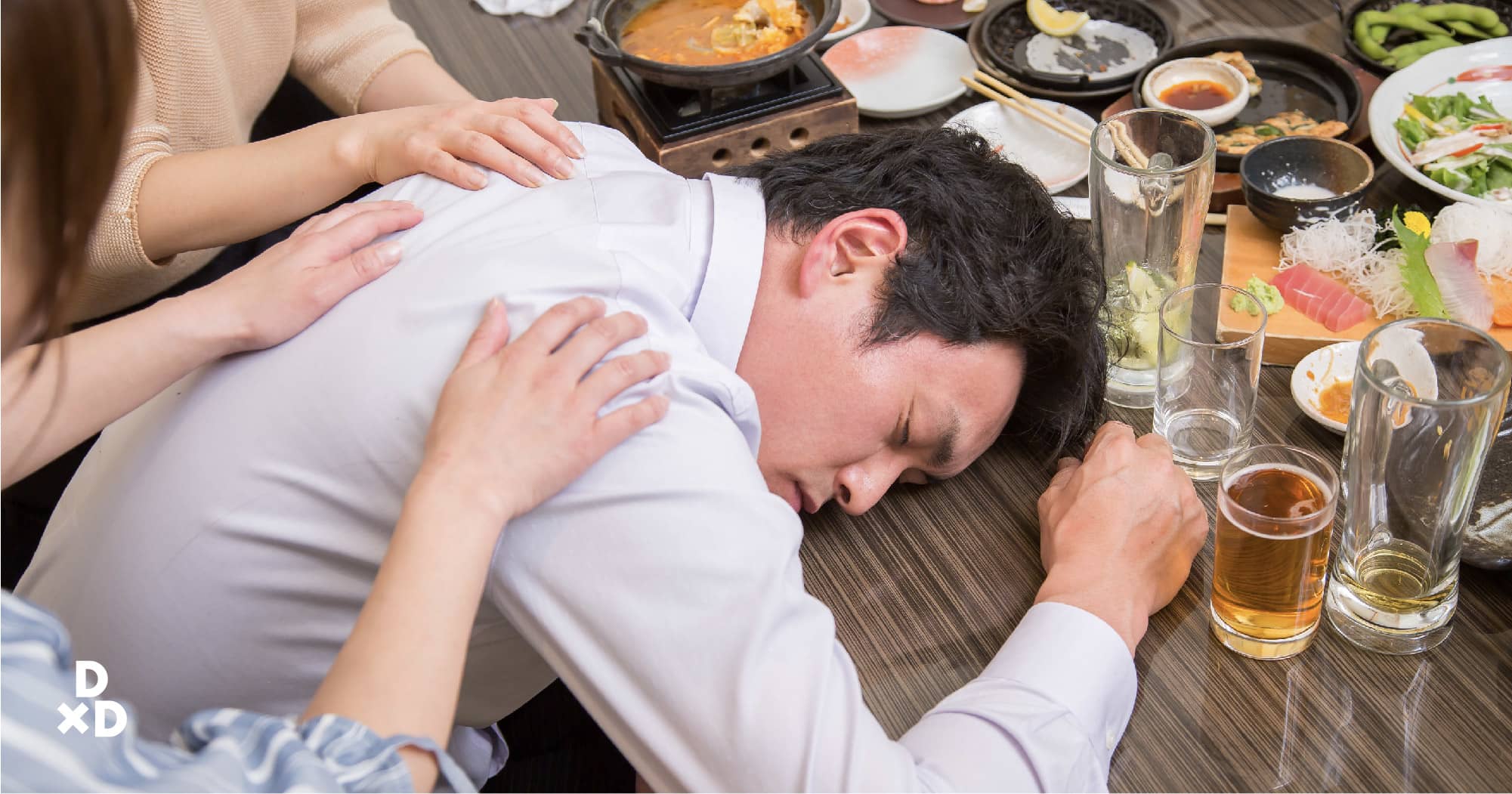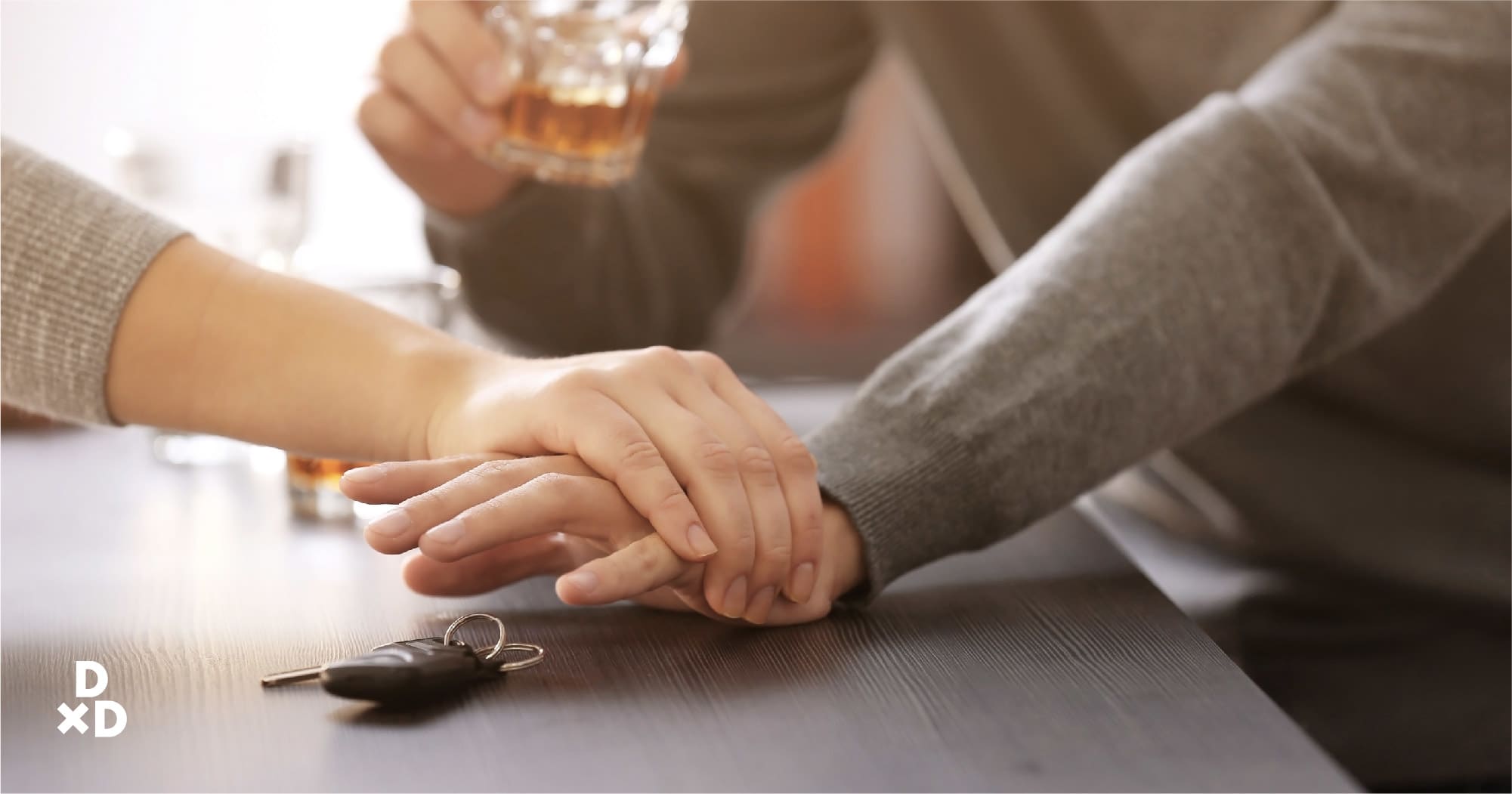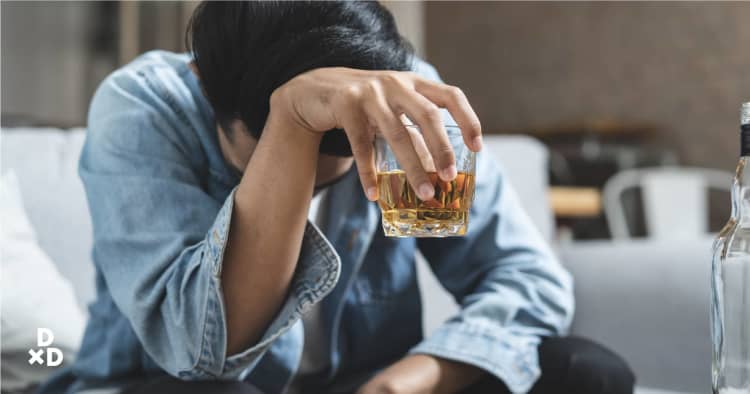What is a hangover?
A hangover refers to the unpleasant symptoms that a person experiences after drinking too much alcohol.
The severity of a hangover varies depending on the person, the type of alcohol consumed, and the amount of alcohol consumed.
Some people may experience hangovers several hours after drinking alcohol, while others may only start to experience symptoms the next day. [1]
What are the symptoms of a hangover?
Hangover symptoms start to appear when your blood-alcohol level starts to fall. [2]
These symptoms are at its worst when your blood-alcohol level drops to zero.
Symptoms of a hangover include:
- Headache
- Nausea and vomiting
- Red eyes
- Excessive thirst
- Body ache
- Sensitivity to light and sound
- Stomach upset or pain
- Fatigue
- Bad breath
- Excess saliva
- Trouble concentrating
- Fast heartbeat
- Dizziness
- Diarrhoea
- Trembling or shaking
- Mood disturbances, such as anxiety, low mood, or irritability

What causes a hangover?
Drinking too much alcohol causes a hangover for several reasons: [2][3]
Dehydration
Alcohol is a diuretic. This means that it causes a person to urinate more, which can lead to dehydration. Dehydration results in hangover symptoms, including, fatigue, excessive thirst, lightheadedness, and headache.
Poor sleep quality
Although people tend to fall asleep quicker after drinking alcohol, their sleep is often unrefreshing, shallow, and fragmented. Having poor quality sleep results in fatigue, mood disturbances, and worsen hangover symptoms.
Stomach irritation
Alcohol directly irritates the lining of the stomach. This causes the stomach to produce more acid and slow the time it takes for the stomach to empty. This can lead to nausea, vomiting, and stomach pain.
Inflammation
Alcohol can trigger inflammation in your body. This can result in a general feeling of body discomfort and trouble concentrating.
Low blood sugar
Drinking alcohol can cause people’s blood sugar levels to drop significantly. This can result in shakiness, fatigue, mood disturbances, body weakness, and in severe cases, seizures.
Widening of blood vessels
Alcohol causes blood vessels to relax and widen, resulting in headaches.
Toxins released from alcohol breakdown
When the body breaks down alcohol, a short-lived toxin called acetaldehyde is created. Acetaldehyde can cause headaches, fast heartbeat, stomach upset, and worsen hangover symptoms.
- Congeners
Congeners are a substance that is produced during the fermentation process of alcohol. Although these substances give alcoholic beverages their flavour, they can worsen hangover symptoms. Dark liquors, such as whiskey, contain larger amounts of congeners, as opposed to clear liquors such as vodka.
- Mini alcohol-withdrawal
Drinking alcohol can help people feel relaxed and happy. The brain starts to adjust to the buzz of alcohol to help the body stay balanced. Therefore, when the feel-good effects of alcohol start to wear off, people can feel more anxious than before they drank.
How long do hangovers last?
Hangovers can last up to 72 hours after drinking. However, most people will experience a hangover that is shorter in duration. [4]

Why do some people experience worse hangovers than others?
The severity of a hangover varies from person to person. Several factors can cause hangovers to be worse. These include:
The amount of alcohol consumed
The greater the amount of alcohol consumed, the worse the hangover experienced is. [5]
Type of alcohol consumed
As mentioned earlier, darker alcoholic drinks, such as whiskey, brandy, red wine, and tequila can cause worse hangovers than clear drinks, such as gin and vodka. This is because darker alcoholic drinks contain more congeners, which can worsen hangover symptoms. [4]
Ethnicity
People of Chinese, Japanese, and Korean descent are more likely to experience worse hangovers. This is because most Asians have a genetically reduced ability to break down a toxin called acetaldehyde. Acetaldehyde is a substance that is produced when the body breaks down alcohol.
As a result, acetaldehyde takes a much longer time to be cleared from their blood. This causes worse hangovers at lower amounts of alcohol and reddening of the skin, which is also known as “Asian flush”. [4]
Biological sex
On average, 5 - 8 drinks for men, and 3 - 5 drinks for women are enough to cause a hangover. [4]
Here is why men and women have different alcohol tolerance:
- Ability to dilute alcohol
If a man and a woman drink the same amount of alcohol, the woman is more likely to experience a worse hangover. This is because men have a higher percentage of water in their bodies.
On average, men have 61% body water, while women have 52% body water. Therefore, men’s bodies are able to dilute more alcohol than a woman can.
As women cannot dilute alcohol as well as men, alcohol starts to build up in the blood at a much higher level. [6]
- Ability to breakdown alcohol
Women have less alcohol dehydrogenase, an enzyme produced by the liver which helps break down alcohol, than men. Therefore, women are more likely to be affected by alcohol as they take a longer time to break it down. [6]
Age
Hangovers get worse with age. This is because as we age, our bodies produce less alcohol dehydrogenase, an enzyme produced by the liver which helps break down alcohol. As a result, it takes longer to break down alcohol as we get older. [7]
Amount of sleep
Having a reduced amount of sleeping time after drinking alcohol will result in more severe hangovers. [8]

Are hangovers dangerous?
In some cases, hangovers can become dangerous. Hangovers negatively affect a person’s ability to concentrate and make decisions. It also causes poor coordination.
Therefore, it is dangerous to drive, operate machinery, or care for others if you are hungover. [3] Studies have shown that driving with a hangover is just as dangerous as driving drunk. [9]
How can I prevent a hangover?
The famous saying “prevention is better than cure” rings true in the case of hangovers. There are a few different things that you can do to help prevent or lessen the severity of hangovers.
Read: Methods to prevent a hangover, here.
If I feel like I am going to throw up, should I stop myself?
If you feel like you are going to vomit, you should not stop yourself from throwing up. Throwing up is your body’s way of removing toxins and poisons, which, in this case, is the alcohol. It is best to listen to your body and throw up naturally.
What are the best hangover cures?
There is no absolute cure for a hangover. However, there are things you can do which can help relieve your symptoms [2]:
- Drink lots of water: To rehydrate your body
- Eat nutritious foods: To provide nutrients and electrolytes. The best type of food is chicken soup with rice or noodles mixed into it.
- Eat bland foods: To help ease your stomach. Examples of bland foods include bread, toast, or plain crackers.
- Eat fruits: The fructose found in fruit may help the body break down alcohol. Fruits such as bananas, avocados and strawberries are good choices.
- Rest: Having a good night’s sleep can speed up recovery.
- Painkillers: Taking ibuprofen or aspirin the morning after drinking can ease headaches and muscle cramps.
What medication should I avoid when hungover?
You should avoid taking medicines that contain paracetamol, such as Panadol. Taking paracetamol (Panadol) with alcohol can cause serious liver damage. This is because both paracetamol (Panadol) and alcohol are broken down in the liver.
Your liver can become overwhelmed if you take paracetamol (Panadol) while alcohol is still in your system. This means that your liver is unable to break down the paracetamol (Panadol) and alcohol, causing them to build up to toxic levels.
It is much safer to take aspirin or ibuprofen instead [10].
When should I consult a doctor for a hangover?
Drinking too much alcohol over a short period of time can cause alcohol poisoning. Alcohol poisoning is a life-threatening emergency that requires immediate medical attention.
Seek immediate medical attention if you or someone who is drinking experience the following symptoms:
- Irregular breathing
- Slow breathing (less than 8 breaths per minute)
- Low body temperature
- Pale skin or bluish-tinged skin
- Continuous vomiting
- Confusion
- Unconsciousness

What should I do while waiting for medical help to arrive?
While you are waiting for medical help to arrive, there are several things you can do to prevent serious health complications from developing.
These include:
- Sit up and keep awake
- Drink water
- Keep warm
If you are with someone who has become unconscious and you suspect they have alcohol poisoning, lie them on their side in the recovery position. Continue to stay with them and check if they are breathing normally. [11]
Common myths about hangovers debunked
Scientific research has shown that many hangover remedies that are thought to cure a hangover are actually untrue.
These myths and misconceptions are unable to relieve hangovers, and may even cause more harm than good.
Here are some of the most common hangover myths that you should stop believing now:
Myth 1: Drinking more alcohol the morning after can cure a hangover
Fact: While this may make you temporarily feel better, drinking alcohol the morning after will only postpone your inevitable hangover. This is because hangovers symptoms start to appear when your blood-alcohol level drops.
While it is true that drinking alcohol in the morning prevents your levels from decreasing, at some point, you would need to face the music and stop drinking. Your blood-alcohol level will then drop, and you may experience an even worse hangover.
Instead of reaching for another alcoholic drink, the best way to cure your hangover is by drinking water, sports drinks, fruit juice, or herbal tea. [3][12][13]
Myth 2: Making yourself throw up after drinking can prevent a hangover
Fact: No, you should never try to make yourself throw up intentionally. Making yourself throw up can lead to health complications, such as:
- Tears in your oesophagus, which can lead to internal bleeding
- Aspiration. This is when vomit accidentally goes into the lungs, which can result in pneumonia
- Damage to the lining of the stomach
- Acid reflux
- Damage to teeth
Also, intentionally throwing up may cause you to experience worse hangover symptoms. This is because vomiting can lead to dehydration, resulting in symptoms including headaches, fatigue, excessive thirst, and lightheadedness.
Myth 3: Drinking lots of coffee can speed up alcohol metabolism
Fact: Although coffee can help you feel more alert, it does not affect the breakdown of alcohol. In fact, drinking lots of coffee may worsen dehydration and make you feel more nauseous.
Just like alcohol, the caffeine in coffee is a diuretic. This causes a person to urinate more, which can cause further dehydration. Secondly, coffee is highly acidic. Having coffee after a night of drinking can irritate the digestive system, which can worsen your nausea. [12]
Instead of coffee, it’s best to drink water, fruit juice, sports drink, and herbal tea.
Myth 4: Eating greasy food for breakfast can relieve a hangover
Fact: Eating greasy food the morning after a night of drinking might make your hangover worse. [12] Alcohol irritates your digestive system, which causes an upset stomach.
Greasy foods contain a high amount of fat, which can cause bloating, nausea, and stomach pain. Therefore, greasy food can further irritate your digestive system, making your hangover symptoms worse.
Instead, the best foods to eat during a hangover include:
- Chicken soup
- Bananas
- Eggs
- Oats
- Spinach
- Avocados
- Simple healthy carbohydrates (e.g. toast, plain crackers)
Myth 5: Take painkillers before going to bed can prevent a hangover
Fact: Taking painkillers before bed will not help you feel better when you wake up. This is because painkillers, such as ibuprofen, and aspirin only provide relief for 4 - 6 hours.
So, by the time you wake up, the effects of the painkillers would have worn off. Instead, it is best to take painkillers when you first wake up.

Myth 6: The order of your drinks matter: “Beer before liquor, never sicker; liquor before beer, you’re in the clear”
Fact: The order of your drinks does not matter and has no effect on the severity of your hangover. Rather, the amount of alcohol your drink matters the most. The best way to prevent a hangover is to drink moderately and pace yourself. [14]
Summary
Ideally, it would be best to pace yourself when drinking and to drink in acceptable amounts in order to avoid a hangover in the first place. However, understandably drinking too much may be unavoidable or accidental, and so, we hope this guide will help you manage your hangover and its symptoms better.
For more information, read on for our article on 9 Doctor tried-and-tested hangover prevention methods, here.













